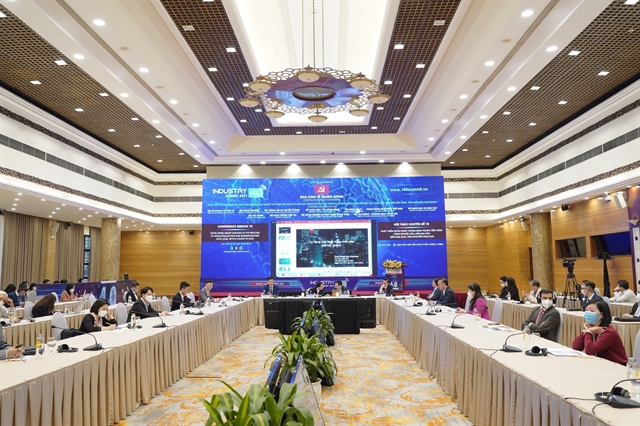A workshop on developing smart banks in the process of industrialisation and modernisation by 2030 with a vision to 2045 took place on Thursday in the framework of the third Industry 4.0 Summit and Expo.

A workshop on developing smart banks in the process of industrialisation and modernisation by 2030 took place on Thursday in the framework of the third Industry 4.0 Summit and Expo.
In his opening remarks, deputy head of the Party Central Committee’s Economic Commission Nguyen Duc Hien said the Politburo’s Resolution No 52-NQ/TW determines the financial-banking sector as one of the priority sectors in digital transformation.
The Governor of the State Bank of Viet Nam (SBV) issued Decision No 810/QD-NHNN approving a plan for digital transformation of the banking sector by 2025, with a vision to 2030, focusing on developing a digital and smart banking system.
According to Deputy Governor of the SBV Pham Tien Dung, digital transformation of the banking industry has achieved positive results. The central bank has reviewed and issued legal regulations to meet the digital banking model, digital banking services, innovation activities, application of new technological achievements, data protection, rights and legitimate interests of customers.
The achievements of the 4th Industrial Revolution have been widely applied to core banking services. Mobile payment has grown rapidly with 90 per cent in quantity and 150 per cent in value.
According to McKinsey's research, many Vietnamese banks have over 90 per cent of transactions on digital channels, and the country is among the regional nations seeing the highest digital adoption rate in the banking industry, creating opportunities for banks.
In addition, a digital payment and digital ecosystem has been established by connecting digital banking services with most other digital services in the economy, providing seamless experiences in all fields and utilities for users in digital services.
Dung said the plan for digital transformation of the banking industry aims to develop digital banking models, increase utilities and improve the customer experience.
To realise the targets, the central bank will prepare resources for digital transformation and continue to improve the legal framework to facilitate the process.
The central bank will also focus on developing digital infrastructure, connecting and sharing the banking sector’s data with other sectors, developing digital banking models, applying technologies to provide products and services in a safe and convenient manner with low cost, and ensuring safety and cyber security as well as rights and legitimate interests of customers.
Delegates also debated smart bank development in the world and in the region, and the need to switch to a smart banking model, strategies and comprehensive solutions to promote the development of smart banking, and measures to ensure security and safety of information systems.

Phung Duy Khuong, VPBank’s deputy general director said: “Consumers are looking for smarter, safer and faster technology. Banks must also be smarter, faster automated, and offer personalised services to customers.”
The change in consumer behaviour and needs is clearly reflected in the survey results of market research company Nielsen. Accordingly, the percentage of Vietnamese using mobile banking and internet banking in the fourth quarter of 2018 was 22 and 28 per cent, respectively. Nearly three years later, in the third quarter of 2021, these rates increased to 68 and 75 per cent.
In particular, the COVID-19 pandemic has become a catalyst for faster change. Results from a Nielsen survey in 2021 showed that nearly 40 per cent of consumers in Viet Nam who are using digital banking said they would use it more often even if COVID-19 was under control.
“Therefore, a smart bank must be ahead of customers' needs,” he said, adding that sometimes customers have not yet discovered that they have such a need. "Smart banks need to be suggestive to customers about products and services that customers may need in the future."
The digital transformation process, based on VPBank's customer-centric approach to providing services and products, could be a typical example of a smart banking model in the future, he said. In the past few years, VPBank had implemented a comprehensive digital transformation strategy, bringing the bank's financial services and products to digital channels, even customer care services.
He said that currently, all of VPBank's products and services could be provided through digital channels for a better customer experience. For individual customers or small and medium-sized businesses, opening an online account through banking apps such as VPBank NEO and VPBank NEOBiz had become much simpler and faster thanks to the eKYC method. Customers could also open a credit card or apply for an unsecured loan and get disbursed completely through the app in just a few minutes, instead of having to go to traditional transaction offices as before.
VPBank developed VPBank NEO app to become an easy ecosystem to connect with partners. This capability helped customers shop, spend and invest financially right on the banking application. As a result, by the end of September 2021, the total number of digital transactions on VPBank's channels accounted for 98 per cent, satisfying users' new habits of self-service and self-experience. The rate of new customers opening through digital banking channels also accounted for 83 per cent of all channels. Besides, more than 80 per cent of customer care services had been resolved and provided by VPBank through call centres and other online channels.
“The banking market is in a phase where organisations that can lead customers to the latest and most advanced digital services first will gain market share faster. It would also help retain customers to stay longer because digital technology has an irresistible attraction. VPBank is proud because we have partly understood and applied this philosophy to our business activities,” he added. — VNS





